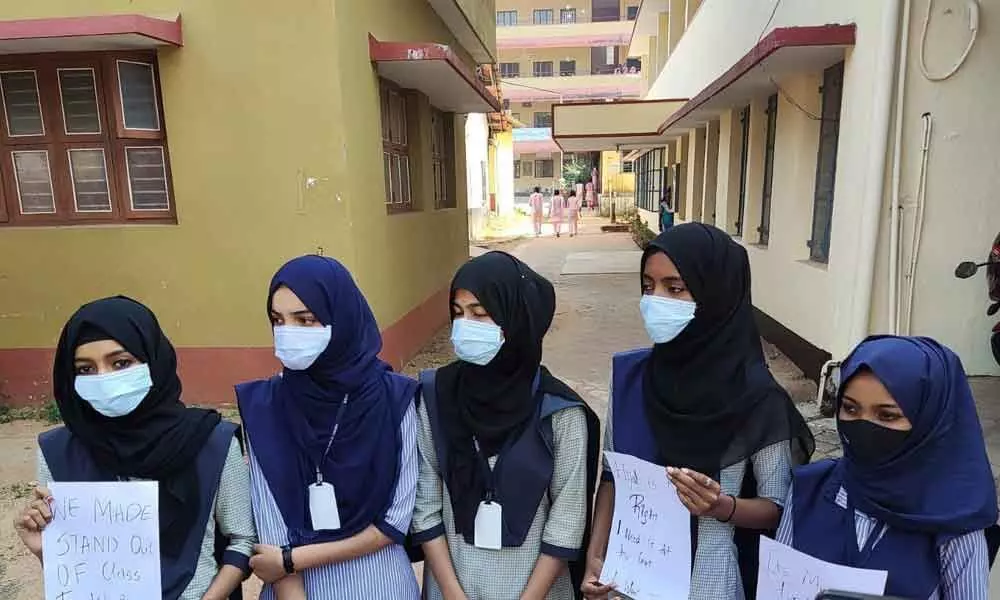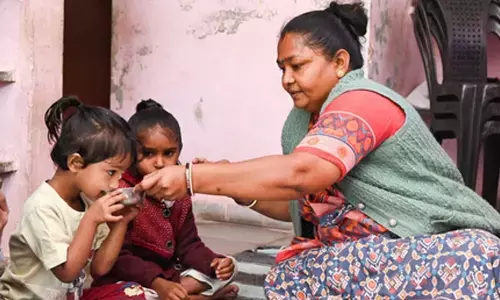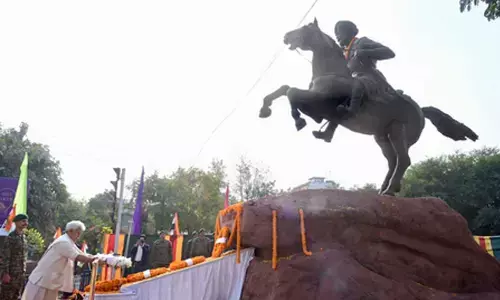Bengaluru: Time for govt to put an end to hijab row before vested interests fish in troubled waters

Time for govt to put an end to hijab row before vested interests fish in troubled waters
What is being thought to be a storm in a teacup, the hijab (headscarf) issue that has rocked a college in Udupi town in Karnataka has turned out to be a major embarrassment for the government, if not a communal flashpoint?
Bengaluru: What is being thought to be a storm in a teacup, the hijab (headscarf) issue that has rocked a college in Udupi town in Karnataka has turned out to be a major embarrassment for the government, if not a communal flashpoint? The right to wear hijab in schools by students of a minority community is being kept alive year after year. The entry of big communal powers is expected to happen soon if a way out is not found at the earliest.
Basically, it is a two-edged knife and might cut both ways. The Muslim clerics and a few 'motivated' parents want their girl children to practise 'Islamic' dress code in schools to keep the identity intact, while the Hindu groups not only object to this in educational institutions but also would not hesitate to break the rules of schools by creating their own religious identity by wearing saffron shawls (angavastram) in classrooms.
After 13 years of keeping this issue on the backburner, the present government has woken up to the reality that this could lead to disturbing ramifications in the wake of half-a-dozen students of the Government Women's Pre-University College in Udupi have undertaken a protest demanding their right to wear headscarf to classroom. Rudre Gowda, principal of the college, maintains that the students are allowed to wear hijab and burqa until they reach their desk and they must remove them once class starts.
Education Minister B.C. Nagesh is in favour of getting the issue examined by a high-level committee formed for the purpose to end the impasse.
A letter issued Saturday by Padmini S N, under-secretary of the Education Department (Pre-University Education), said, "Presently, there is no uniform prescribed by the department to follow and it has been left to the discretion of colleges. But after the incident in Udupi district where students demand that they be allowed to attend college in clothes of their choice (hijab), the State government has decided to study the court orders on this issue and a committee will be formed."
The first incident of this sort had happened in 2009 in Uppinangady, Puttur taluk and later spread to other places, where only girl students were targeted. "Yes, we see a pattern in this. The schools and colleges will allow headscarves, for now, later even the boys and men will start wearing skull caps and women will start wearing burkha to the college, so what is wrong if we use saffron shawls or lungis? Many of us take the Ayyappa Vritam every year, so what is wrong if we grow a beard and wear a black lungi to the schools and colleges?" ask ABVP activists.
Sadiq Jarattharu, State general secretary of Campus Front of India, agrees that his organisation is giving the frontal leadership on this issue to the Muslim girls who are facing this problem in Udupi. "We are in the middle of a crisis, especially the girl students. They have their constitutional right to religious expression, be it in schools, colleges or anywhere. This right is now being challenged by the Hindutva activists and the school managements are being driven by Hindutva activists which is worrying us," Sadiq said.
There were only sporadic incidents of one or two girl students questioning the management's decision to impose uniform norms before they petered out as they either stopped going to school or stopped wearing hijab. But in recent times the protests against the uniform have increased. This trend has echoed in Kodagu, Shivamogga, Chikkamgalur and Uttara Kannada.
But going by the activists of Hindu Jagarana Vedike (HJV) which is more active in the coast and Malnad areas of the State, "The issue can be handled only through stronger measures. Either the government should bring in a uniform law, or we have our own plans. If hijab is not banned inside the classrooms we will ask lakhs of our activists both boys girls to wear their religious symbols to the classrooms.
School uniform is for all students not just for Hindu to follow. If the uniform code can be bent and modified for some students so be it for all," Prakash Kukkkehalli, HJV regional head told The Hans India. "We respect the school uniform and wear it as well. All that we are asking is for a minor addition of a headscarf for Muslim students. Our parents and elders do not insist on our wearing burkha because there is a uniform dress code in place.
But they will not allow us to go to school without headscarf. In our community, women and girls are required to cover their heads with scarves. Some families do not allow their daughters to leave the house without it, so if we are not allowed to wear headscarves, we would have to drop out of school," said one of the students of the college who pleaded for anonymity.
The importance of general and professional education has now been firmly embedded into the Muslim community's family ethos, according to the Muslim Educational Institutes Federation and Minorities Guidance Forum, which together run over 120 schools and colleges. "As a result, an increasing number of female students are enrolling in schools and universities that are not only run by community institutions but also by other communities.
"In recent years, the Federation has organised family sensitization programmes for parents in order to educate them about the importance of educating their children, particularly girls. As a result, we now see an equal number of boys and girls from the community pursuing education in all fields and working for both the government and private sector."
Private schools and colleges are also now thinking of strictly adhering to the uniform rule. "Why should we be left out from this rule if a sense of equality can be instilled among our students. We have no problems as it is one headache less," said a top functionary of the Private Schools Management Association.
















